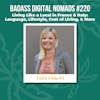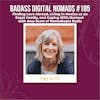Is It Possible To Fully Integrate With a Foreign Culture?

Do you ever really fit in with the locals in a foreign country? Kristin explores the answer to this question through the fascinating story of a famous chef who moved to Japan (and what happened next). Note: This episode includes some profanity.
Do you ever really fit in with the locals in a foreign country? Kristin explores the answer to this question through the fascinating story of a famous chef who moved to Japan (and what happened next).
Note: This episode includes some profanity.
Episode 152 Special Offers:
- 20% off Organifi Superfood Blends and Travel Packs 🌱
- Pre-Order Digital Nomads for Dummies
- Join the Digital Nomad Visa Database
Related Videos:
- American Living in Japan
- Cost of Living in Japan as a Foreigner
- Cherry Blossoms in Japan
- Japan Travel Playlist
- Co-Living in Roppongi (Apartment Tour)
- Anthony Bourdain Documentary
Resources Mentioned:
- Place: Meguro River, Japan
- Podcast: Spousal Depression from Living Abroad
- Podcast: How To Learn a Foreign Language Fast
- Article: Should You Go to College or Become a Digital Nomad?
More About Ivan Ramen:
...........................................................................................
Connect with Kristin:
- Follow on Instagram
- Subscribe to Traveling with Kristin on YouTube
- Subscribe to Digital Nomad TV on YouTube
- Join the Badass Digital Nomads Facebook Group
...........................................................................................
Support the Badass Digital Nomads Podcast:
- Buy Kristin a Coffee
- Become a Patron
- Leave a 5-Star Review
- Buy Official Merch
- www.badassdigitalnomads.com
...........................................................................................
A special thank you to Kristin's Patrons: Walt, Shawn, Richard Y, Heather, Karen, Kiran, Scott, Michael J, Isaac, Mike M, Yasmine, Erick M, Yohji, Ron, Gary, Annie, Henry L, Keith, Stephen, Warren, James, Daniel, Gary B, Emily, Rich, Phil, Anthony, Jennifer, Kathleen, Dave B, Brian, Christopher, CJ, David G, Mike R, Chip, Shelly, Ron, Paul, Andy, Jeffrey, Paulo, Stephen, Michelle, DJ, Francis, Dave M, Carlos, and Ron
Become a Patron for $5/month at Patreon.com/travelingwithkristin
Special welcome to my newest Patron, Karissa! ❤️
...........................................................................................
Podcast descriptions may contain affiliate links of products and services we use and recommend at no additional cost to you.
Sneak Peek:
Kristin: 00:00:00 And he was thinking, you know, I'm 40 years old. I hate my job. It's now or never. Like, let's move back to Japan. And his wife's like, are you serious?
Introduction: Welcome to Badass Digital Nomads, where we're pushing the boundaries of remote work and travel, all while staying grounded with a little bit of old school philosophy, self-development, and business advice from our guests.
Kristin Wilson, Host: 00:00:34 Hey there, Kristin, from Traveling with Kristin here, and welcome to episode 152 of Badass Digital Nomads. I'm just sitting here having a lovely evening. I hope you are too. Morning, afternoon or evening, wherever you are in the world.
Organifi:
And I'm sitting here sipping on some Organifi gold. This has become my nightly ritual. I absolutely love it. Organifi is our sponsor today and they make powerful super food products for any time of day. Gold has been my go-to at night because it's perfect for rest and relaxation with turmeric, ginger, vanilla, lemon balm, and Reishi Mushroom also has some coconut milk and cinnamon in it. It's just so soothing and delicious, and you can give it a try or check out their other products at organifishop.com/travel or use the code travel and you can get 20% off your first order. So that is Organifi with an I - o r g a n i f i shop.com/travel, and you can check out their full line of products in all the colors and flavors. Great to support a healthy lifestyle.
Kristin: 00:01:58 The question that I am going to try to answer for you today is, is it possible to fully integrate with a foreign culture? This is a question that I've been pondering for quite some time as long as I have been traveling to different countries and I believe that I have found the answer at least one answer. I came across this episode of Chef's Table that I had never seen before. It is about Yvonne or Ivan. I'm speaking in Spanish. Yvonne - Ivan Orkin, who is a ramen chef. Well, he's a a chef. He's a cook in New York with his own ramen shop. And after seeing this episode of Chef's Table where they tell his story of going to Japan and coming back to start this restaurant, I realized it was a perfect case study for what's possible for you when you move abroad.
Kristin: 00:03:12 And his experience of just how he was able to integrate the, with the culture and to what extent and what happened because of that. Just an incredible story. I highly recommend for you to check out the episode on Netflix. I'll link to it in the show notes, but I'm going to paraphrase his story for you here and give you my perspective on why I think that his experience is so significant and helpful for all of us when navigating foreign cultures. And my big takeaway from it, because I don't think that I've ever heard of an example like this before. So as I mentioned, Ivan is the owner of this very successful ramen shop in New York City, but it wasn't always that way. Ivan came from an upper-middle-class family on Long Island, and he was in his own words, the fuck up of the family.
Kristin: 00:04:22 Uh, like many children, he struggled in school, he struggled to concentrate, he couldn't focus, he constantly got in trouble. His parents were disappointed in him, and he basically felt like the black sheep kind of felt lost and like he didn't fit in, and he didn't have any direction in life. And you know what, now that I'm saying this, he actually kind of reminds me a bit of Anthony Bourdain, just kind of this rough and tumble attitude like school of hard knocks, very smart, very talented, but never really saw himself that way and found himself through cooking. So basically as a kid, always getting in trouble. His parents and teachers, no one could see his potential and in fact, they told him that he had limited potential. And so he ended up getting this job washing dishes at a Japanese restaurant in New York when he was only 15 years old.
Kristin: 00:05:26 And this ended up changing his life because he really enjoyed working there. He was treated very kindly there. He was treated with respect and he just thought, wow, good food, good people, nice people, interesting language. And he was just very intrigued overall with the culture and having, uh, lived in Japan for a few months. And I've made quite a few videos about living there that I'll link to in the show notes. Uh, this does not surprise me because if you've seen my video on living in Japan as an American, you know that I think very highly of the Japanese people. I think that they're very polite, very kind and breaking into Japanese society as a foreigner is a whole nother story, which we're gonna get into today. But, uh, having that glimpse of an experience of living in Japan, I can definitely see what Ivan saw in working in this Japanese restaurant as just a teenager.
Kristin: 00:06:33 And he's very fortunate that he did end up working there because his life was never going to be the same. So this experience, washing dishes in a Japanese restaurant, led him to major in Japanese in college. And this is something else that really resonated with me because like many of you, I did not know what I wanted to major in in college. It was a, a big source of anxiety for me, and I think many young people can definitely relate to that. And you end up just picking something and hoping for the best. And so this experience gave him the direction to choose the Japanese language as his focus in college. And after that, again, feeling lost, didn't know what to do, something that many of us can relate to. He thought, well, the next best thing is to go to Japan because he had spent all this time learning the language.
Kristin: 00:07:32 And this fits in quite nicely actually with last week's episode about how to learn a language fast now that I'm thinking about it. Um, so he went to Japan and he was just me, mesmerized. I mean, he, he says in Chef's Table that the moment the wheels touched down on the tarmac, he felt like he was at home. And I certainly didn't feel that feeling when the wheels touched down on the tarmac of San Jose airport in Costa Rica. I felt terrified and I was crying, but when I went back, I felt like it was home. And if you've, um, ever traveled to a foreign country, you may have had the experience where sometimes you get there and you don't feel that emotional connection to the country or the people. And and sometimes that connection develops over time, but sometimes you just feel it instantly and you feel it before you even get off the plane.
Kristin: 00:08:34 You just know that you are at home or you know that you're gonna love that place and that you're going to have a special experience. And so I got goosebumps when I heard that he felt at home just when landing at the airport and especially after having such a difficult childhood where he felt like he didn't fit in in the United States to then fly to the other side of the world and feel at home is very significant. But of course, once he got to Japan, it was difficult and he realized that he didn't speak Japanese well and he discovered how hard it is to assimilate in that culture. And so he started to feel lost again. He felt like he had maybe made a mistake and just couldn't really figure it out, couldn't find him himself or find his place there. And that was until he met his future wife, Tami.
Kristin: 00:09:37 And he and Tami hit it off. It was love at first sight and she showed him another side of Tokyo and Japan that he didn't have access to before as the tall white Jewish, New Yorker. So he ended up learning Japanese by living there, which is consistent with what we talked about last week on the podcast with cultural immersion and, um, learning by living with the locals or even by getting a boyfriend or girlfriend who can help teach you the language. And that was certainly his experience as well. And once he started fitting in there, he described his experience there as magical, incredible, intense, and that it almost brought him to tears. And so in 1990, he and Tami moved back to New York, but he, he knew that his chapter in Japan had not closed yet and he knew that he would be back. And so he goes back to New York, but at this point he has no idea again what to do with his life because he's like, how am I gonna use my Japanese major living in New York?
Kristin: 00:10:56 So he ends up getting a job selling computer chips at his wife's company. And of course he's horrible at this and he never sells anything. And his dad's like, listen, you like food, why don't you go to culinary school? And so he's like, it, go into culinary school, he goes, he hates it <laugh>, but he realizes that he does love cooking and he's not half bad at it, so learns to cook and then starts getting jobs at different restaurants in New York, including Bobby Flay's Mesa Grill. So that's a pretty good, uh, spot to work at. But then his wife gets pregnant and he's working in these restaurants and he realizes that he can't make ends meet in New York on his salary. I think he said his take home pay was like $225 a week. And so having a child was a wake up call to do something else.
Kristin: 00:11:50 So he goes to work with restaurant associates and gets this really stable, boring job that he's not passionate about at all, but it gives him the discipline that he needs to be able to provide for his family. Unfortunately, tragedy struck soon thereafter. And when his son was only two years old and his wife was pregnant with their second child, she passed away suddenly from toxic shock syndrome. And so here was Ivan, a single dad with a two year old and just starting over again, like just not knowing what to do and, and going through, you know, an extremely traumatic and horrific experience just trying to heal over the years from this horrible loss. And the years go on. He's doing the best he can, but he realizes that, you know, his son has lost his connection to Japan and he has lost his connection to Japan because, uh, Tami was his lifeline and to the Japanese culture.
Kristin: 00:13:11 And so he decides, okay, I'm going to go back to Japan once per year, take my son and just make sure that he gets exposure to half of his heritage. And on one of these trips back to Japan, he is introduced to his next future wife through a mutual friend again. They hit it off. She's actually a single mom, he's a single dad. They both have a son and their sons become best friends and they just have this really special connection. Uh, however, she lives in Tokyo, he lives in New York, so he has to go back to New York and back to his job and everything, but he can't stop thinking about her. Her name's Mari. So he tells his boss like, look, I gotta go back to Tokyo, I catch you later. And he goes back to Tokyo. They end up getting married within two months.
Kristin: 00:14:12 Like she moves back to New York, applies for her green card, they move in together and like everything's great. So, and after she gets her green card and she can travel, they decide to go back to Japan because finally they can, you know, go back and he just feels these emotions again, like this deep connection to Japan. And of course now his family is Japanese, his children are Japanese and he's walking along this part of Tokyo. It's like, I actually was in the same place that they show in the video. I can't remember the name of it right now. I'm gonna look it up and link to it in the show notes. It's like a very beautiful picturesque place and it's just stunning. And so Ivan and Mari are back there during cherry blossom season. He's walking down the sidewalk and just feeling so overwhelmed with emotion by the beauty that he sees around him.
Kristin: 00:15:19 And he was thinking, you know, I'm 40 years old, I hate my job. It's now or never. Like, let's move back to Japan. And his wife's like, are you serious? And he said, yeah, let's do it. And what struck me about this was not just obviously the beauty of cherry blossom season and these emotions like upwelling in him that prompted him to make this seemingly spontaneous decision, but something that he had been wanting to do for so many years. But it's that he lived in Japan previously and he understood the language and the culture and the people enough to understand the cultural significance of saura season, of cherry blossom season. That it's very fleeting. These flowers bloom for a very short time and then they fall to the ground and, and the cherry blossom season moves with the blooms going from north to south throughout the country.
Kristin: 00:16:27 And so you can really only catch it in certain cities for a couple weeks at a time before it's over with. And so the Japanese, um, this has so much significance to them and they have so much reverence for this time. And I think him not just seeing what he saw around him, but also understanding the significance of this time to the people and really what it means in life, you know, that life is short and then taking this chance and taking this risk to go back. That's what really stood out to me there. So Ivan and Mari move back with their kids to Tokyo start their new lives there. Mari goes back to her old job as a stylist, and Ivan is just a stay-at-home dad. He's like cooking and cleaning, but he started to experience this spousal depression that goes on typically in expat family.
Kristin: 00:17:25 So if, uh, an expat family moves to another country depending on who's working, like usually it's either for the husband or the wife's job. And so let's say the husband's working, the wife has to give up her job to move to that other country. She can suffer from a form of spousal depression because she loses her sense of self and and her career identity to move to another country for her partner. And I thought it was really interesting that this was inverted because there's like a higher percentage of men that were getting those offshore positions compared to women. So in this case, Mari was the breadwinner. Ivan was the stay-at-home dad experiencing this, the spousal depression. And so his wife encouraged him to get a job actually to open his own restaurant. And what she suggested was for him to open a ramen shop. Now, this would be crazy <laugh> because ramen is to Japan as hamburgers are to the United States as baguettes are to France.
Kristin: 00:18:43 There are more than 80,000 ramen shops in Japan. And it would just be very strange to have this American guy making ramen in Tokyo. And so he felt very self-conscious about doing that, but he decided to go for it and take that risk. And he said that he felt like his whole life to that point was leading up to this decision and this opportunity. And so he threw himself into studying how to make ramen and he started bringing part of his skills from New York and his heritage, um, being born in New York and integrating that into his own ramen recipes. And what he ended up doing, which no other Japanese chefs were doing at the time, was he decided to make his own noodles. And he used a different blend of flour that no one had ever used before. And he used rye flour, so drawing on his Jewish heritage and uh, transplanting it into Japanese cuisine.
Kristin: 00:19:54 And I mean, this was just un unheard of. And so when he went to open his ramen shop, rather than open in Rappongi, which is the very kind of luxurious, upscale, expensive area of Tokyo, it's, it's a neighborhood with a lot of foreigners. It's actually where I lived. He decided to open in a local area. So everyone was like, why don't you open in Rappongi? Like you'll have so many international clients. And he's like, fuck that. Like, I wanna live with the locals. Like that's what I'm here for. And so he decides to open in this very local area and he said that his dream was to just speak Japanese all day, no breaks for English and just live in that neighborhood, immerse himself in the culture, uh, serving Japanese people and just go a hundred percent, uh, committed to integrating there and living a local lifestyle.
Kristin: 00:20:57 And he did it. So as it turns out, spoiler alert, his ramen is really delicious. <laugh> the, uh, this food critic comes in who's eaten more ramen than any other man in Japan. And he tries the ramen, he loves it. He publishes stories about Ivan's Ramen and it goes viral. Like Ivan ends up on TV shows, he has his own brand of like instant ramen that you can buy at the seven elevens <laugh>. And he just blows up and he becomes a raving success. And like people couldn't believe it, the locals couldn't believe that a foreigner could make such good ramen. And this went on for 10 years. He was very successful. And then he decided one day, you know what, I think that my work here is done, my time here is done. And he decided to go back to New York. Um, he wanted, he had another child at that point, so now there's three kids.
Kristin: 00:22:04 They wanted their youngest son to meet his family. He missed his family, his parents were getting older. And so they moved back to New York and he basically starts over again from zero, another new chapter in life. And he ends up opening another restaurant, which I will link to also in the show notes because you can actually order his ramen online. It's very expensive, but yeah, it's like $80 for two people. But you can order his ramen dishes. So he doesn't copy what he did in Japan. He creates a whole new type of cuisine, a whole new type of ramen that is blending even more so his New York roots, but also with that Japanese flare. And so by this point, he's obviously very fluent in Japanese and um, his restaurant has, you know, international attention. He's on chef's table, like this guy has made it, he's a raving success in every sense of the word, but what he says is that the greatest success that he's ever had is managing to achieve fully living in Japan.
Kristin: 00:23:24 And he said, no one can take that away from me. Like I've done it. Check <laugh>, I'm onto other things now. And what struck me about his story was that, you know, it doesn't mean that if you go to another country that you have to stay there for 20 years and you know, major in that language in college and then marry a local. Like you don't have to follow the same path that he did. But despite all of his success, his real goal was to adapt to that place and to feel at home there. And he innately felt at home the first time his plan landed in Tokyo. And then he went on this 20 year journey of, of learning and visiting the country and going back and forth and then living there again and starting the restaurant to really, really, really get to know the people and really feel at home.
Kristin: 00:24:25 And even though he became a superstar ramen chef there, if strangers didn't know who he was and they just saw him walking down the street, nobody would think, oh, he's a Japanese or he's local. And if I'm walking down the street in Japan, no one's gonna think that I'm local. And if you don't look local in the place that you're living and you're walking down the street, no one's gonna think that you're a local. Even if you're fluent in the language, even if you've lived there for 10 years, like you're just gonna look different. But what's important and what cultural integration is all about is your inner circle of people whose lives you touch. Who do you get to know in those countries and how do you impact them? How do they impact you? It's not about having your face on a billboard or having the approval of every single person in that society saying like, yes, you are one of us.
Kristin: 00:25:35 It just has to be this little nucleus of people that are important to you and having a life experience and an exchange that wouldn't happen if you hadn't been to that country. So yes, of course it's important to learn the language and be able to communicate with the locals. It doesn't mean that they're ever gonna see you as a Mexican or a Costa Rican or South African or Japanese or German, but you're going to make friends there. And Ivan Ramen wouldn't exist if he never went to Japan like this melding and blending of cultures. It would've happened whether we knew about it or not. Like the fact that it got onto a TV show, and I'm talking about it on a podcast now, is just because it's a good story. But there are millions and millions of other people who are having just as significant life experiences, who are making friends, who are sharing their culture, who are leaving behind parts of their culture and like eliminating things that they don't like about their culture and adopting and integrating and accepting parts of a new culture that they prefer.
Kristin: 00:26:58 And they are changing the lives of the people that they meet along the way. And maybe for you, you end up staying in that place forever. Maybe you just stay in your home country, but you go on more long-term trips where you give yourself some time to really get to know that place and those people. And maybe you go back once a year just like Ivan did for a week or so at a time. And each time you go, you learn something new, you see something new, you perceive something different that you didn't see before because you didn't have the depth of knowledge of the culture that you have now. And maybe like Ivan, you come back to your home country and things come full circle. But when you come back, you've changed. You are different. Whether or not you come back with a wife and three kids, you are a different person.
Kristin: 00:28:01 And I think that's always for the better, no matter where you travel to, no matter for how long you can go for, you are better off for having had that exposure and that experience and the people that you meet are better off for having met you. And um, hopefully you can bring a little piece of that wherever you go. When Ivan's wife passed away, one of the things that helped him heal was going back to Japan and the serendipity and the things that happened when he got there. And it just goes to show that, you know, no matter how dark things can get, things are always changing and things can always get better and they will get better. And you know what? He showed all of the doubters, all of the haters, even his parents, anyone who didn't believe in him, he showed that he did have limitless potential.
Kristin: 00:29:08 And this part of his story also really moved me as well, because so many kids are, you know, told that they aren't gifted or they need extra help or, you know, they're falling behind or they need a tutor or they're not good at school and they think that they're just not good at life because they don't fit into the post-industrial model of school that's like, can drain the life out of kids, even the best students. Gosh, that really hit me as well because there's just so many kids out there that don't think that they're smart because they don't wanna sit through all of those hours of school every day and they'd be better off in a different type of school or, or with a mentor in a trade school or an apprenticeship of some kind. Maybe all of us would've been better off that way.
Kristin: 00:30:04 And that can stick with you your entire life until you realize that you know, those people were wrong. And that if you're, if you're not good at school, that doesn't mean that you're not going to be good at anything. It just means that, uh, you're good at something different. Um, my ex-boyfriend from high school, he almost failed out of school and I helped him with all of his homework because school was my thing. But he became a very, very successful and famous artist with like his own line of Adidas clothing and, and water bottles with his art on them that are on commercials in the Olympics. And like he paints murals on walls and works, you know, for marketing companies like Saatchi and Saatchi. I mean, he became a huge success and he barely graduated from high school. Um, so anyway, Ivan was in a similar situation and I'm sure many of you listening have had teachers or somebody tell you that you couldn't do something.
Kristin: 00:31:05 And then this also happens in the workforce. And that's a big part of why we're seeing the great resignation and the great reshuffling is because a lot of people are in jobs that aren't right for them. And so I just found this story very inspiring that, uh, Ivan quit his job selling computer chips and ends up becoming a ramen God. Like, who would've thought? Um, but you know, sometimes you need to invent your own job and you don't know exactly what's going to happen, but it only takes one person to believe in you. In this case it was his wife. And if you don't think that anyone believes in you, then I believe in you. So do that thing that you want to do, and I hope that Ivan's story can help give you some context and perspective and to what it's really like to integrate with a culture.
Kristin: 00:31:54 And that it doesn't mean that the whole society accepts you, it just means that you do the best effort that you can. Uh, you keep an open mind and you try, you know, you don't have to be accepted by everyone, but, um, you will change somebody's life. So I don't know what Ivan will do next, and he probably doesn't either, but what I see in his story is proof positive that you don't have to change who you are to succeed in life or to fit in with a foreign country. So stay true to yourself. Go to the places that you feel called to go and integrate with the people that you meet little by little. You might never have your face on a billboard in Japan, but you'll make friends, you'll share your culture with the people you meet, and their lives will change because of their interactions with you.
Kristin: 00:32:51 And both of you will be changed for the better because of it. You'll learn more about yourselves, you'll learn more about each other. You'll feel more purpose in life, more fulfillment, more gratitude and off for the world and this time that we're living in. And, and the fact that we're able to travel to these places to be able to choose and live in other cultures voluntarily, one culture, two cultures, 12 cultures, and then to bring what you've learned either back to your home country or to the next place that you choose to go. So what do you guys think? Do you think it's possible to fully integrate with another society? Or what does integrating with another culture mean to you? Let's start the discussion over in the Badass Digital Nomads Facebook group, and if you'd like to see what my perspective of living in Japan was like, then check out the videos in the show notes and I'll see you again next week.
My first book, Digital Nomads for Dummies, is available for pre-order now wherever books are sold. You can find it by searching on your favorite retailers like Amazon or Barnes and Noble by using the link in the show notes or by going to travelingwithKristin.com/for-dummies. That's f o r dash d u m m i e s.
































































